Learn about the top dating app frauds, how they are conducted, their impact on victims, prevention tips, and how businesses can use identity verification to prevent them.
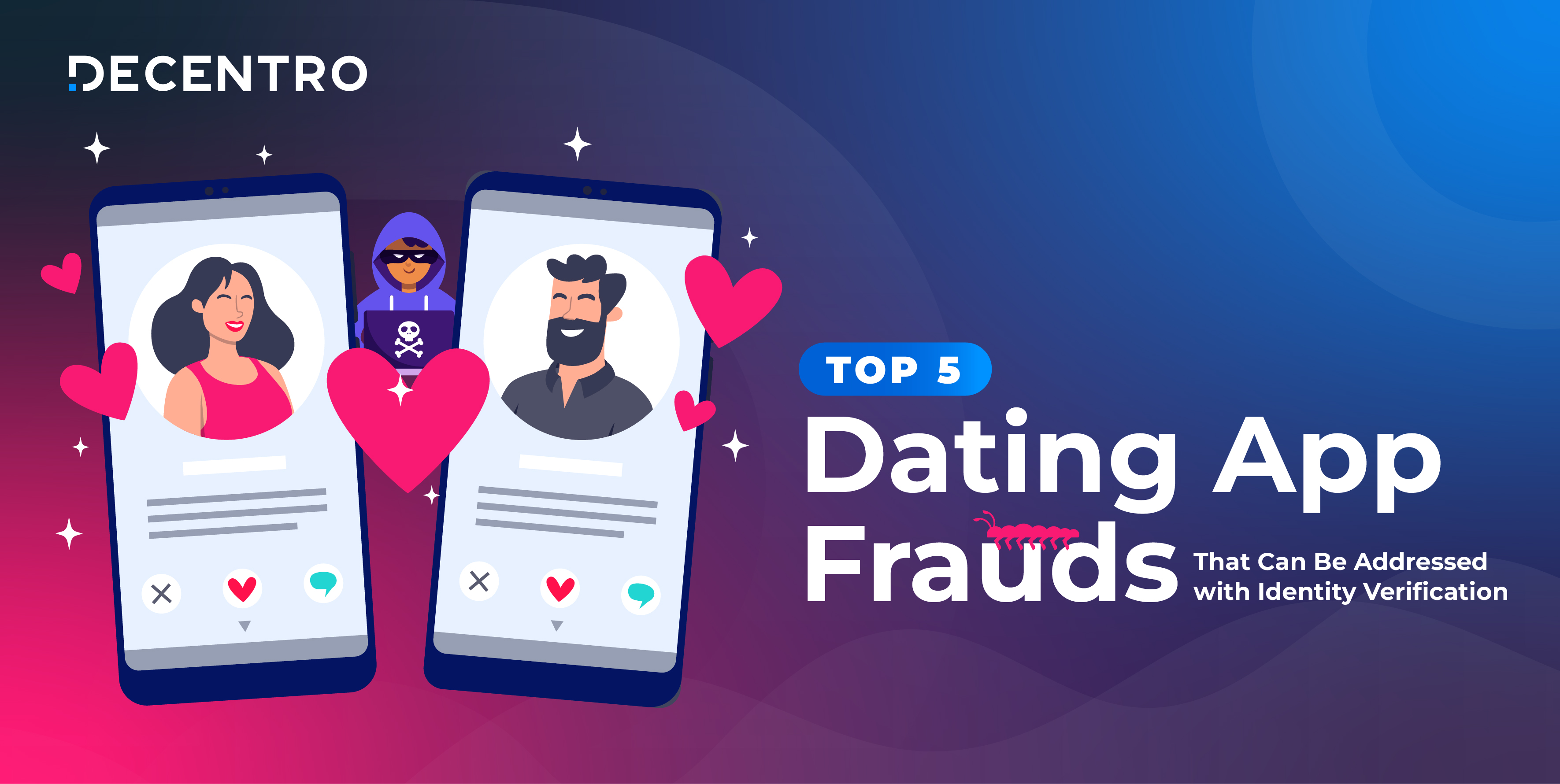
Top 5 Dating App Frauds That Can Be Addressed with Identity Verification
A true blue millennial trying to engineer her full time-career around the world of content. How cliché is that?
Table of Contents

Today, most people prefer dating apps when it comes to finding their better half or just increasing their social circle. However, this convenience has also led to a rise in dating app fraud to epidemic levels, leaving users emotionally stressed and financially drained.
In fact, almost 66% of Indian users have been exploited through online dating schemes, while 77% claim to have come across fake profiles with AI-generated photos on dating apps or websites.
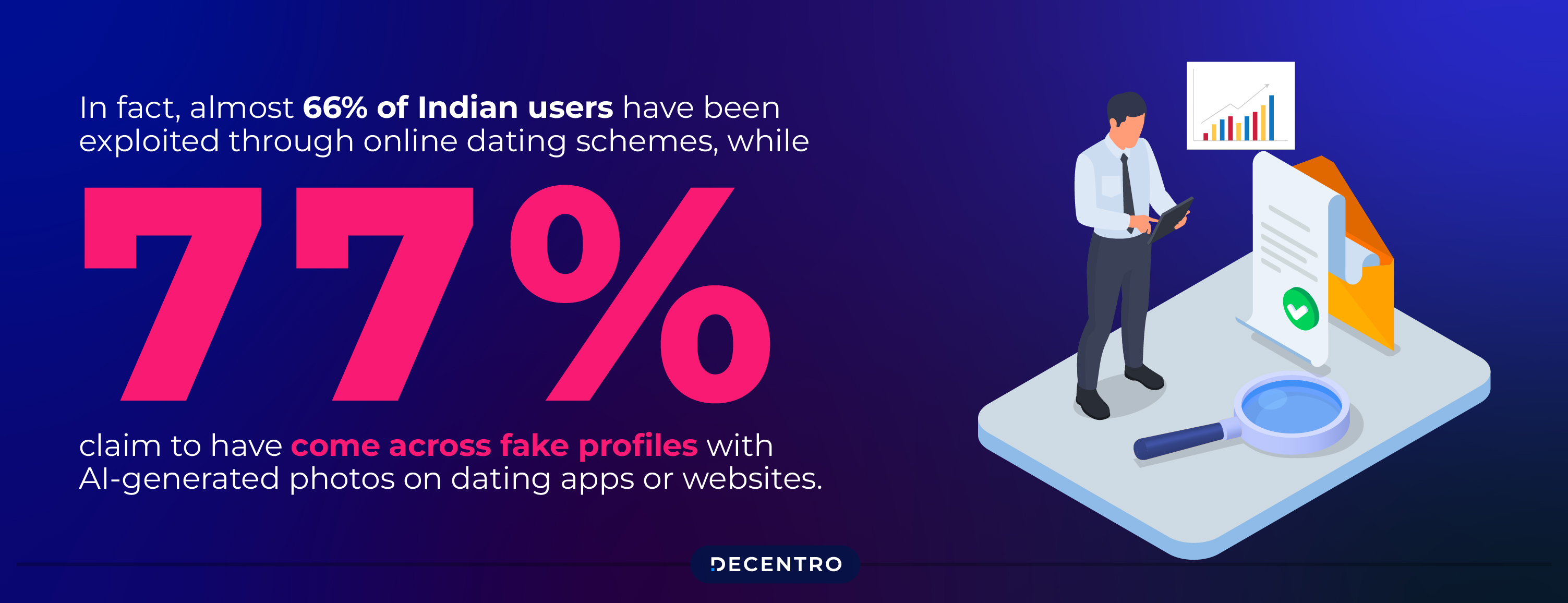
Thus, service providers must take strict action to ensure a safe online dating experience for users. To do so, they need a comprehensive idea of the top dating app frauds, their impact on victims, and how to prevent them.
Understanding Dating App Frauds: What They Are
Dating app frauds (also known as online dating scams) are fraudulent activities by individuals or organised criminal networks aiming to exploit users financially, socially, or emotionally.
They usually target vulnerable people on dating apps or websites, take advantage of their need for companionship, gain their trust, and exploit them for sending money or gaining their personal details.
Now, a significant cause for the rise in dating app frauds is the increase in online dating. According to a report, the number of users in India’s online dating market is expected to reach a whopping 29.2 million by 2029.
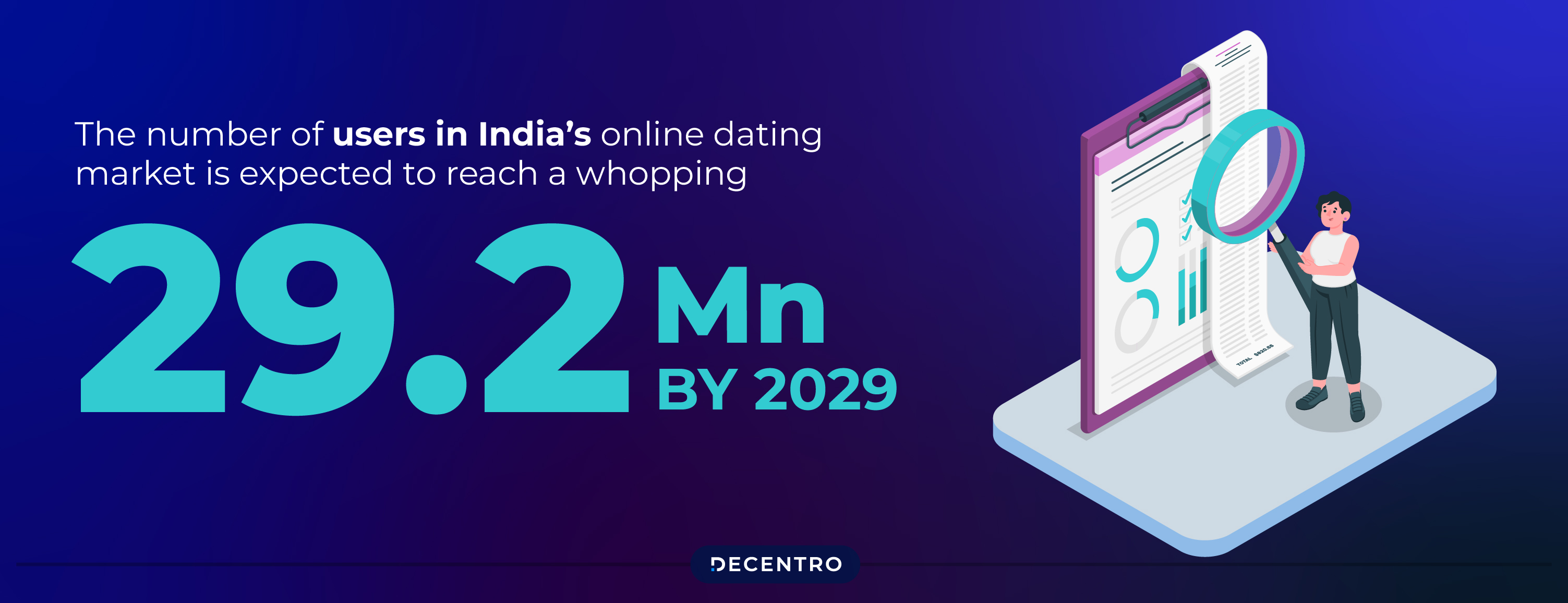
Following are some of the top dating apps in India and their number of active users in India:
| Platform Name | Active Users in India |
| Tinder | 78 Mn (approx.) |
| Bumble | 58 Mn (approx.) |
| OkCupid | 1.79 Mn (approx.) |
| Happn | 100 Mn (approx.) |
| Truly Madly | 9 Mn (approx.) |
| Quack Quack | 34 Mn (approx.) |
Thus, as the number of online dating app users increases, the cases of dating app fraud will also rise in tandem. This is relevant not only in India but also in other parts of the world.
Statistics and Geographical Insights Related to Dating App Frauds
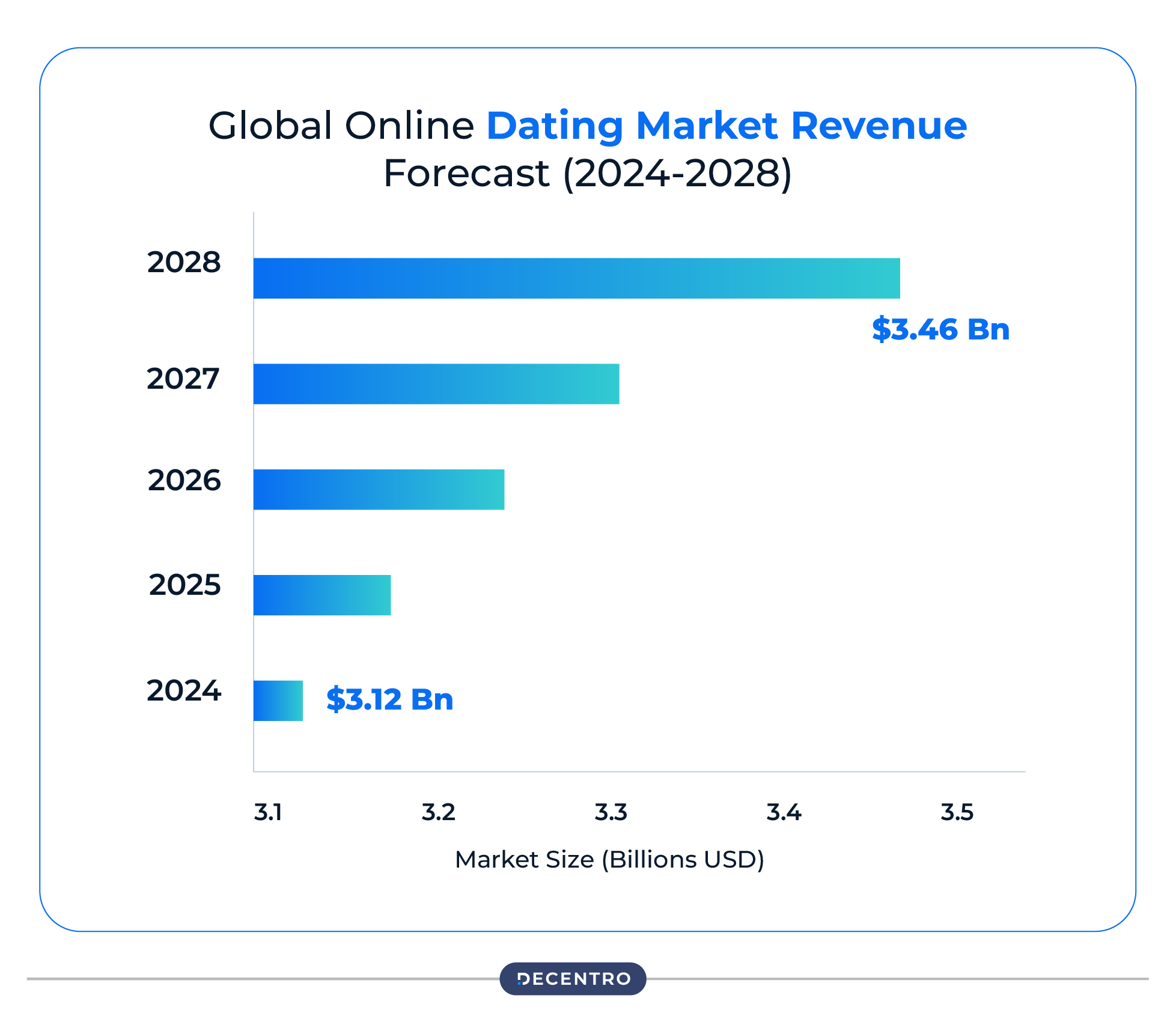
As per reports in January 2023, almost 66% of adults in India have fallen prey to online dating scams. Among the other leading nations worldwide, the numbers are 25% in the United States, New Zealand, and France, 22% in the United Kingdom, Germany, and Australia, and 10% in Japan.
Here are a few more concerning statistics about dating app scams worldwide:
- In 2021, more than 55,000 consumers reported online dating scams to the Federal Trade Commission (FTC), with losses worth almost $547 million.
- In the first half of 2023, significant losses were reported due to online dating frauds initiated via social media platforms like Snapchat, Facebook, and Instagram.
- Reported financial losses due to online dating scams increased from $2,400 in 2021 to $4,400 in 2022, indicating an 80% rise.
- Older adults are more susceptible to online romance scams, with reported financial losses of almost $213 million in 2021.
Understanding Dating App Frauds: How They Work
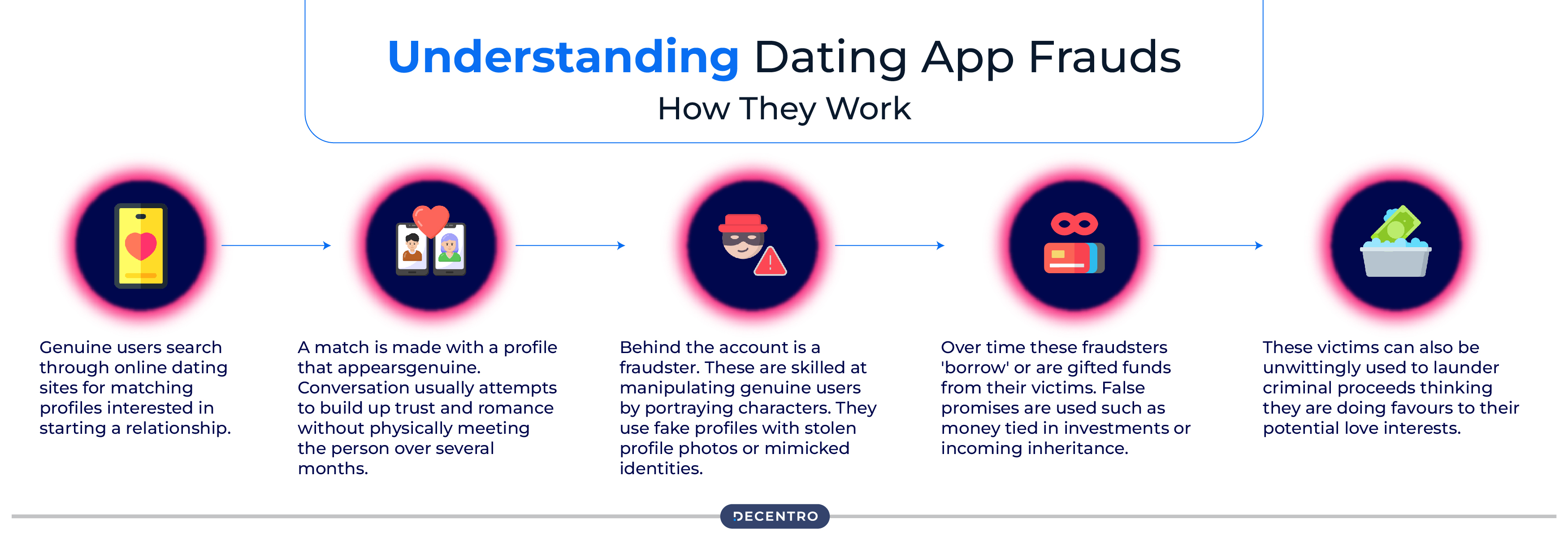
Dating app frauds start when an unsuspecting user makes a match on a dating app or website. They do not realise that they are talking with a scammer who uses a fake profile consisting of attractive photos, which are usually AI-generated or stolen, and appealing descriptions, which they use to impress potential victims.
Once contact is established, the scammer initiates frequent conversations to make a positive impression and gain the victim’s trust. The relationship usually moves quickly, and the individual usually creates a promising backstory and tries to tell the victim they have a meaningful relationship.
Once the victim’s trust is gained, the scammer will try to get funds or personal details from the former through various methods. This will continue until the fraudster has achieved the desired financial gain and blocks the victim on the dating app and social media accounts.
Top 5 Dating App Frauds That Can Be Addressed with Identity Verification

Following are the top dating app frauds that both customers and dating platforms should be aware of:
Catfishing
Catfishing is an online dating app scam in which fraudsters use fake or stolen data to set up profiles on dating websites and trap potential victims. They usually portray a persona that is too good to be true, located far away from the victim’s location, and seem to have everything in common with them.
These individuals tend to be very communicative and deeply personal, convincing the victim they have a special connection. However, they always avoid video calls or upfront meetings by giving some last-minute excuse.
Impact on the Victim
In such cases, the victim may think they have something special going on with the fraudster. As a result, they can lend money or provide personal information (identity or banking details) or sensitive photos/videos, which the scammer can use for other fraudulent activities or extortion.
Prevention Tips
- Look out for profiles with photos that are too attractive. The ones that have supermodel-like or magazine-quality profile pictures are usually fake.
- Catfishing scammers always have newly opened profiles and a limited presence on other social media platforms. So, look out for such signs.
- Conduct a reverse image search on Google Images by copying or taking a screenshot of the individual’s profile picture. If the profile is genuine, the search will lead to multiple social media profiles with the name they provided.
- After getting to know each other for a while, ask the person to appear for a video call or a meeting at a public place. If they are catfishing, they will devise an excuse to avoid such interactions.
- Initially, do not share personal details like your date of birth, address, financial information, upcoming travel plans, family members and friends’ names, or the places you usually visit.
- Never give money or share any sensitive photos or videos.
Subscription Scams
Subscription scams are dating app frauds in which scammers try to lure unaware victims to join fake online dating websites where they can find the perfect match in their area.
They will urge people to sign up and open a profile, which requires an upfront fee, detailed personal information (like photos and bank account details) for setting up the account, and even permissions to access other apps on the person’s phone.
Impact on the Victim
If individuals take the bait and sign up on such fake apps or websites, they can expose their sensitive data to scammers. They can use this information to build fake profiles, commit fraud in the victim’s name, or sell the data to other fraudsters.
The website can also ask the person to download an app or software that could be potential malware or ransomware. This software can steal their banking details and even lock them out of their devices until a ransom is paid.
Prevention Tips
- Avoid installing any dating app that is not present on the Google Play Store or the iOS app store.
- Do not visit websites or links flagged as suspicious by your computer’s antivirus software.
- Watch for signs like low-quality images, poor web design, spelling mistakes, and charged language. These usually indicate that you have visited a phishing website.
- Check if you have to visit a different website or download an attachment to view the photos of new matches. Also, see whether they offer to show obscene photos immediately upon matching and urge you to visit a different website. If it’s so, they are fake profiles that are being operated by bots.
- Look for signs that the signup process includes more personal details (including banking information) than dating-related questions.
- Watch whether all the profiles are of newly joined attractive singles who readily want to mingle.
- If you get several matches when you sign up and haven’t even set up your profile or uploaded a profile picture, it is a sure sign of a phishing website.
Blackmail Using Private Photos/Videos
Several individuals visit dating apps or websites seeking quick, intimate relationships. Also, there may be cases when a vulnerable person seeking a meaningful connection may be influenced to enter into an intimate relationship via the dating platform.
Scammers tend to target both types of individuals. As soon as they match, the relationship moves forward pretty quickly, leading to the point where they ask the victims to share sensitive photos or videos and promise to send their own in exchange.
In some cases, the fraudsters may also send intimate photos/videos stolen from other people, send them to the victims, claiming them as their own and asking for theirs in return.
Impact on the Victim
Once the victims are lured into sending their intimate photos/videos, there’s no turning back. The scammers will threaten the victims by leaking them to their family, friends, coworkers, and even their social media accounts unless they pay a ransom.
They can also ask for other sensitive information like identity and banking details and ask them to perform different tasks, some of which can be illegal.
Prevention Tips
- Refrain from sharing intimate photos or videos with anyone you have just met on a dating app.
- Even if you end up doing so, remember, it is not your fault. If the scammer asks for money, report it to the Cyber Crime Cell or any related authority in your area. They can get the photos/videos deleted if they are posted, trace the individual’s location, and help you take legal action.
- Stay aware of conversations that move too fast to an intimate phase, with the individual expressing emotions for you immediately.
- Watch out if what the person says about themselves matches the information on their profiles.
- Block the individual if they ask you or pressure you for private photos/videos, especially those showing your face.
- In case you have already made the money transfer to the scammer, contact your bank and lodge a complaint to see whether they can recover the funds.
Overseas Military, Doctors, or Developers Scam
There are several scammers on dating apps that pose as doctors, military personnel, or developers who are posted overseas. This makes it easier for them to avoid any physical meetings and blame the bad internet connection for not being able to appear on video calls.
Once they have gained the victim’s trust, they will create believable scenarios in which the victim requires urgent funds and has lost access to their bank accounts or has not received their paycheque.
This can range from helping their family living in a different country to covering urgent personal cash requirements. Furthermore, they will promise to repay the amount as soon as they regain access to their funds.
Impact on the Victim
If the victims pay the money, they will never get it back. If they question the individual too much, they will deactivate their dating and social media profiles and disappear.
Also, if the fraudster has your details, they can even create a fake profile in your name in the future and use it to scam other people.
Prevention Tips
- Watch out for red flags, like if the individual claims to have a high-paying job but needs the means to access their bank accounts or the basic cash to pay for basic necessities.
- Also, look out for instances where they have suddenly landed in a legal matter and urgently need funds to pay the fees.
- Check whether they always blame different time zones, a poor internet connection, or a broken front camera for not appearing on a video call. Also, see whether they pick up when you call from your end. In case you notice these signs, staying away from such people is better.
- If they claim to work in a high post in a reputed company, consider verifying the information online.
- If the details of their story always tend to suddenly change, like losing a job and forgetting to inform you, there’s a high chance that the person is a scammer.
Online Dating Crypto Investment Scams
Online dating crypto investment scams are one of the latest and most dangerous dating app frauds. In such cases, the fraudsters maintain a long-term relationship with the victims, and after establishing their trust, they slowly start talking about their interest in cryptocurrencies.
Then, eventually they will offer to guide the individuals in their investment journey in order to build them a profitable portfolio. Hereafter, they will ask the victims to open a legitimate cryptocurrency account and deposit their money.
After this, they will provide a link to access a special crypto exchange in which they will instruct the victim to deposit their crypto assets. The exchange will show higher returns, influencing the individual to increase their investment.
Impact on the Victim
After a certain point, the victim will eventually try to withdraw their earnings. Then, the crypto exchange will ask them to pay a massive tax bill, or the website will shut down, causing them to lose all their earnings. The scammer will also disappear and deactivate their social media and other profiles so the victim cannot contact them.
Prevention Tips
- Be vigilant if anyone you meet on a dating website claims to be an expert in crypto investments and wants to help you get high profits with minimum risk.
- Ask them to discuss investments either on a video call or in person. If they are scammers, they will make an excuse to avoid both.
- Avoid sharing your crypto wallet’s private key.
- Consider avoiding the individual you have met on a dating platform and never meet in person if they ask you to pay in crypto.
Importance of Identity Verification in Addressing Dating App Frauds
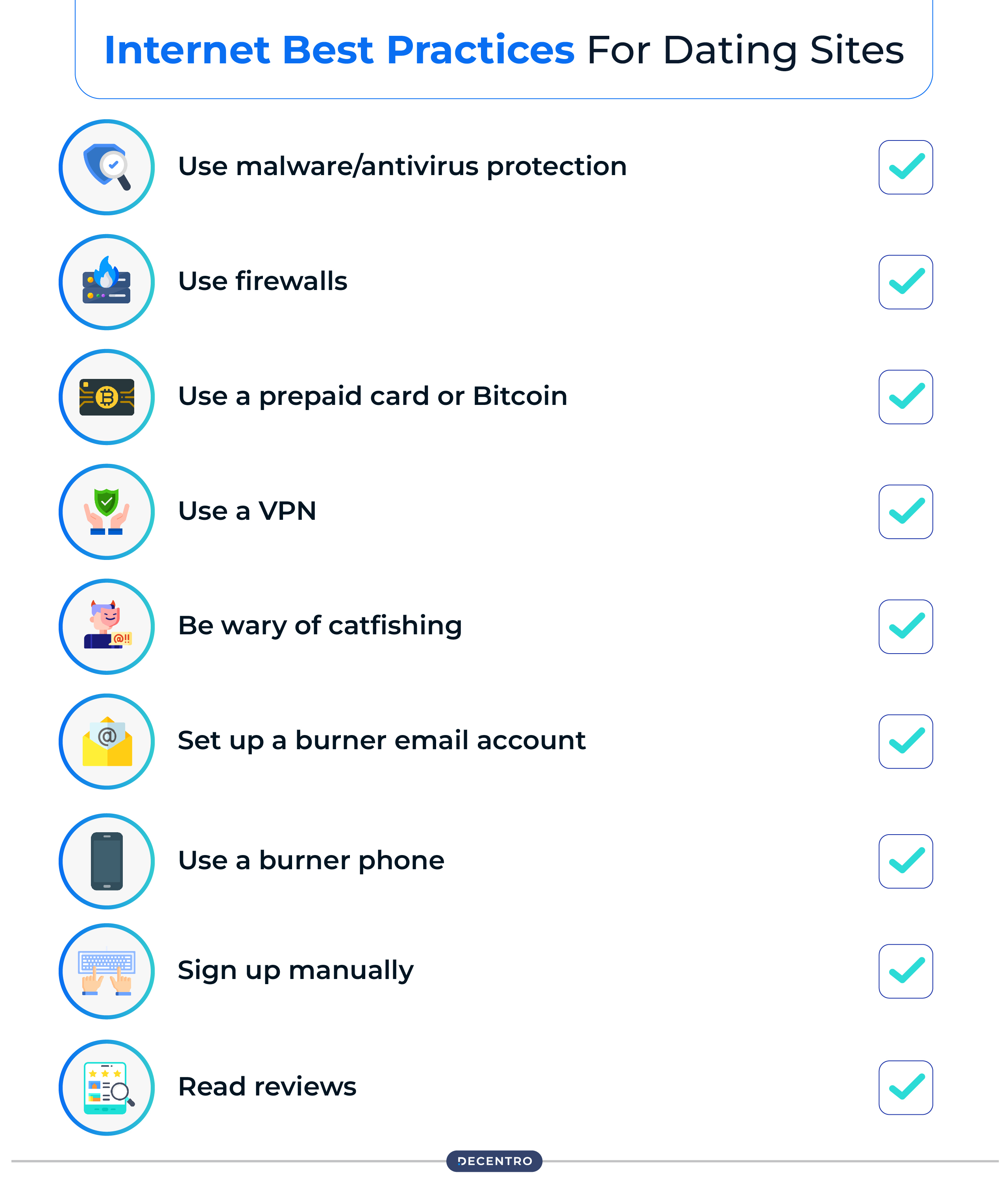
Scammers use fake or stolen identities to perform their operations in all the dating app frauds. Thus, dating apps and websites can implement an effective countermeasure by introducing an identity verification system at the time of account opening.
This will include steps like uploading a government-issued ID, the details of which the platform will cross-check with official portals to verify whether the user is actually who they say they are.
To do so, companies can leverage KYC Verification APIs that enable them to perform real-time Know Your Customer checks by matching their details with national IDs like Aadhaar, PAN, and more.
Furthermore, they can strengthen their verification workflow by implementing additional checks like voter ID, driving licence, vehicle registration, and more, reducing the chances of even seasoned scammers faking their identities.
Now, if an individual’s details are inconsistent with those provided in their documents, dating platforms can suspend the account opening process, preventing them from gaining access to other customers.
This way, they can ensure that only genuine people are onboarded to their platform, ensuring a safe online dating experience for all.
Decentro’s API Solutions: A Shield Against Dating App Frauds
By now, you have realised the importance of identity verification in preventing dating app fraud. However, given the rising popularity of such platforms and the increasing customer volumes, you will need help to perform manual identity verification checks for each individual when onboarding them on your dating app.
In this regard, Integrating our Mobile to X Suite on your app or website can be a masterstroke. The Mobile to X API suite is designed to make alternative data aggregation seamless by retrieving various important datasets using a person’s mobile number.
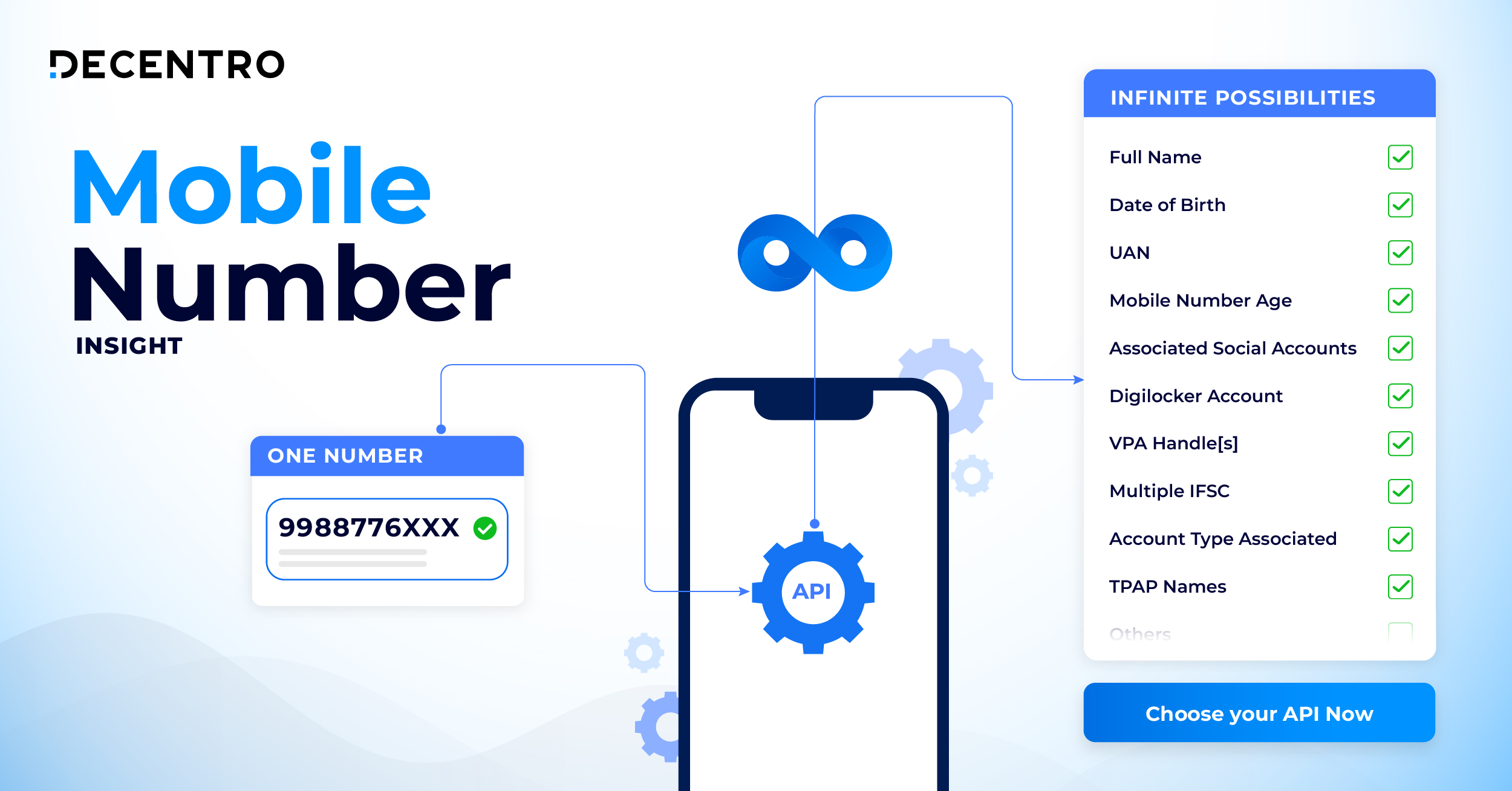
This API enables seamless access to alternative data sources, providing vital information such as name, phone tenure, social intelligence, and UPI VPA linked to a mobile number.
By facilitating these data points, the Mobile to X APIs empower your app to enhance customer onboarding, verification, and overall credibility and experience of your application.
Furthermore, verifying an applicant’s data from multiple sources significantly reduces the chances of a fraudulent individual being onboarded to your platform.
We also have the Face Forensics API suite, which presents cutting-edge tools to elevate facial recognition capabilities and enhance identity verification processes. Powered by Decentro’s advanced technology stack, these APIs can equip your application with robust solutions for optimising its identity authentication and fraud prevention efforts.

- Passive Liveness Check—Our Passive Liveness solution requires no specific actions from the user. It is an AI-driven identity verification solution that offers near-instant verification, a confidence score matching a person’s face, and liveness checking.
- Match Engine—Decentro’s Match Engine ensures accurate matching, a comprehensive understanding and handling of Indian honorifics, and a plethora of salutations across different government IDs.
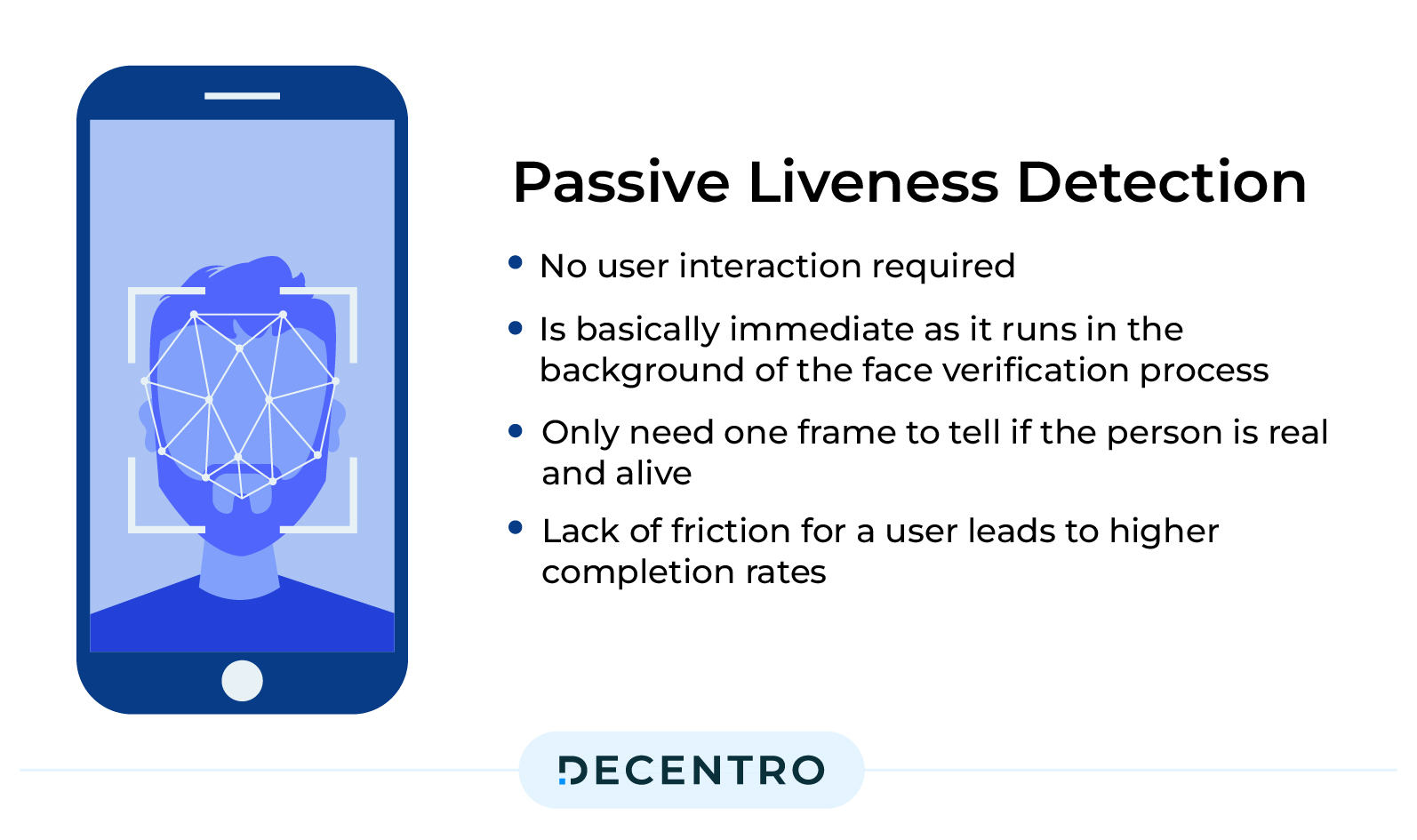
With Decentro, you get:
- A fully flexible API-based flow for verification, extraction, and onboarding of customers
- A single platform to cater to all your KYC needs across ID verification, KYC OCR, CKYC, and DigiLocker.
- Higher success rates with multiple partners integrated on our backend
- Fully compliant with KYC, UIDAI, and other governmental regulators
Ready to explore how Decentro can revolutionise and accelerate your KYC and onboarding process by 10X?
Frequently Asked Questions
What are the most common dating app frauds that can be prevented by identity verification?
The top dating app frauds that can be tackled through identity verification include catfishing, subscription scams, blackmail using private photos or videos, impersonation scams by overseas military or professionals, and online crypto investment scams. These frauds often rely on fake or stolen identities, so robust identity verification can help block most of them at the account creation stage.
How does identity verification help stop catfishing on dating apps?
Identity verification helps prevent catfishing by requiring users to provide government-issued identification or authentic biometric data. This ensures that profiles are genuine and not created using stolen or AI-generated photos and false information, making it much harder for scammers to deceive other users.
Why are users vulnerable to blackmail on dating apps, and how can platforms protect them?
Users are vulnerable to blackmail due to the sharing of sensitive photos or personal details with people they have never met. Dating platforms can protect users by implementing strong identity checks and encouraging users never to share private information without verifying the identity of their matches.
What are the signs of a dating app subscription or investment scam?
Warning signs include requests for upfront payments, asking for excessive personal or banking details during signup, urgency in moving conversations off the app, offers that seem too good to be true, and pressure to invest in cryptocurrency platforms. Scammers may also avoid video calls or in-person meetings and have inconsistent stories.
How can dating platforms implement effective identity verification to reduce fraud?
Dating platforms can use KYC (Know Your Customer) and API-based solutions to verify users via official IDs, mobile numbers, or facial recognition technology. Combining document checks, liveness detection, and cross-referencing with government databases helps ensure only real and traceable users are able to sign up, greatly reducing fraud risks.


